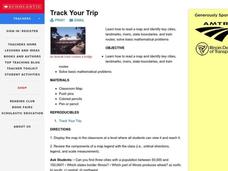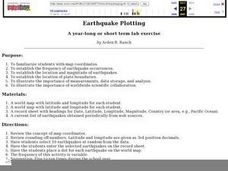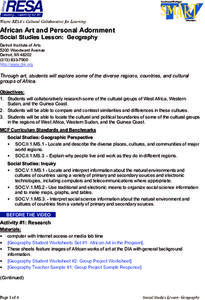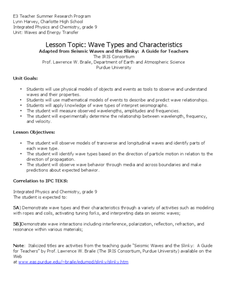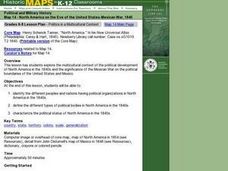Curated OER
My Neighborhood
Second graders discuss maps and identify boundaries found on a map. They walk through their school and nearby neighborhood and collect information regarding important features of the area.
Curated OER
Plate Tectonics
Students simulate the three types of plate boundaries using robots. In this earth science lesson, students explain how earthquakes and volcanoes are formed. They collect real-world earthquake data and plot them on the map.
Curated OER
Sea Floor Spreading
Students recreate sea-floor spreading and the pattern of magnetic stripes that are created by different configurations of plate boundaries. They see how transform faults work.
Curated OER
Lesson- Infinite Potential Well
Student create a numerical model which integrates Schrodinger's equation in 1 dimension. They discuss the properties of the solutions which match the boundary conditions. Student discusss any limitations if there are any in there model.
Curated OER
Where are the Watersheds in San Francisco?
Students create a mental map of San Francisco. They compare it with actual topographical maps of the city. Then they label various locations on the San Francisco Hillshade map and locate watershed boundaries.
Curated OER
Track Your Trip
Fourth graders are shown how to read a map and identify key cities, landmarks, rivers, state boundaries, and train routes. They solve basic mathematical problems. Students reivew the componets of a map legend. They are asked to find...
Curated OER
Safety Bases
Second graders work on dodging in a game situation. Have boundary cones away from walls if playing inside. Have students walk instead of running if they are unable to move safely. Stop the game if students are unable to move safely.
Curated OER
Exploring Earthquakes in Space and Time Through the Internet and a Geographic Information System
Students examine the frequency and distribution of earthquake epicenters and compare these epicenters to the distribution of plate boundaries and cities.
Curated OER
States with Attitude, Latitude and Longitude Dude
Sixth graders identify states whose boundaries are formed by lines of latitude and longitude or natural borders such as rivers. They trace a map of the U.S., and fill in borders, rivers and lines of latitude and longitude.
Curated OER
Earthquake Plotting
Students become familiar with map coordinates. They establish the frequency of earthquake occurrences and study the location and magnitude of earthquakes. To establish the location of plate boundaries.
Curated OER
Geography
Young scholars work together in groups to research the cultural groups of West Africa, Sudan and the Guinea Coast. They compare and contrast each culture and locate the political and cultural boundaries on a map.
Curated OER
When Maine Was Part of Massachusetts
Students analyze a map of Maine to determine its proportions in 1795. They examine Osgood Carleton's map of Maine from 1795 and complete a worksheet. They share their observations with their group and evaluate a present day map of Maine....
Curated OER
Is It Alive?
Eighth graders define the boundaries of living organisms. They determine what makes something a living organism and identify factors that constitute "living." Pupils write a conclusion about the evidence they found that yeast is alive...
Curated OER
Cultural Maps
Fifth graders examine map elements. In small groups they create a map of an imaginary country that includes a title, legend, directional indicator, scale, boundaries, capital cities, country name, and icons of five natural resources. ...
Curated OER
Scavenger Hunt
Students participate in a scavenger hunt to gather information on their governmental officials. Using the internet, they identify and discuss the various political boundaries to determine who their representative is. They complete a...
Curated OER
Wave Types and Characteristics
Ninth graders identify the different parts of a wave. In this physics instructional activity, 9th graders observe wave behavior as it travels through a boundary. They determine the relationship between wavelength, frequency and...
Curated OER
Scarf Tag
Young scholars who are taggers, on the teacher's "GO" signal, try to tag students with scarves. If a student is tagged, the tagged student must give the tagger ONE scarf in order to resume play.
Curated OER
E.T. Tag
Students interact in a game of tag. When students are caught they must practice waiting skills to be "unfrozen".
Curated OER
Waterbasins and Watersheds
Students define water basins and watersheds, then delineate the boundaries of their local water basin/shed using maps.
Curated OER
Sign Language Tag
Students work on their sign language skills using yarn balls to tag with and cones for boundaries.
Curated OER
Regions of the United States
Learners research maps in order to propose geographic reasons for geographic patterns such as state boundaries, interstates and elevations.
Curated OER
Mississippi Under British Rule
Students construct appropriate maps to depict the following information: changes in European territorial claims as a result of the French and Indian War; boundaries of British East and West Florida; significant rivers and settlements of...
Curated OER
Politics in a Multicultural Context
Students explore the multicultural context of the political development of North America in the 1840s and the significance of the Mexican War on the political boundaries of the United States and Mexico.
Curated OER
Sexual Orientation Myths
Students identify personal and cultural values and opinions related to dating and sex. They explore options for sexual expression, including abstinence, and identify sexual boundaries that are personally appropriate and relevant to...
Other popular searches
- Plate Boundaries
- Divergent Boundaries
- Convergent Boundaries
- Transform Boundaries
- Personal Boundaries
- Personal Growth Boundaries
- Setting Personal Boundaries
- Tectonic Plate Boundaries
- National Boundaries
- Plate Boundaries Map
- Plate Boundaries Worksheet
- Regional Boundaries







